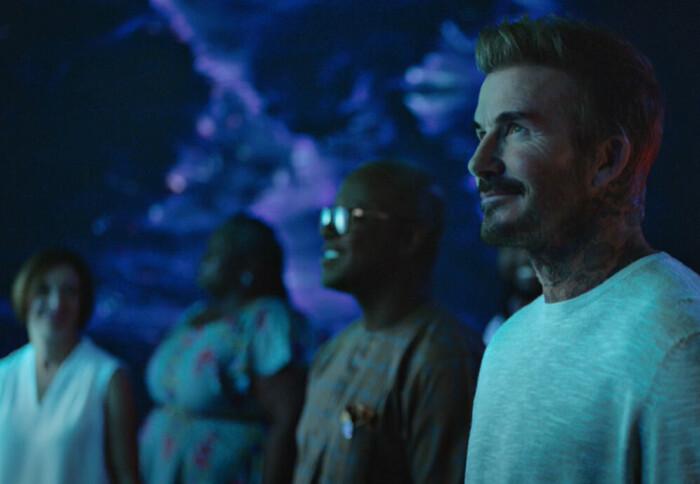David Beckham joins scientists in video launched at Zero Malaria Experience

The Zero Malaria Experience is an immersive and interactive installation using Imperial research showing a 'toolbox' of scientific innovations.
Former professional footballer David Beckham features in the new Zero Malaria campaign film alongside Imperial’s Professor Azra Ghani, Dr Krystal Birungi of Target Malaria and an alliance of malaria scientists, global health experts, campaigners and leaders. The video illustrates the importance of teamwork in beating the disease and was launched at the Zero Malaria Experience at London’s West End.
The Zero Malaria Experience aims to raise awareness about the impact of malaria and the importance of continued investment into scientific advances to end this disease. Using new research from Imperial’s MRC Centre for Global Infectious Disease Analysis, the Experience tells the story of how a ‘toolbox’ of scientific innovations has helped to reduce malaria over the past 60 years. In addition, the Experience allows visitors to select combinations from a ‘toolbox’ of cutting-edge future tools to explore how many millions of lives they can save when used together.

We really can do incredible things when our scientists work together with leaders around the world David Beckham Zero Malaria ambassador
The underlying modelling, undertaken by Dr Hillary Topazian, Lydia Haile, and Dr Peter Winskill from Imperial’s School of Public Health, estimates that over 13.2 million lives could be saved in sub-Saharan Africa in the next 15 years (from 2025 until 2040) from existing and viable future tools. This is an average of nearly 900,000 lives a year and equates to just under the population of Rio de Janeiro (13.8 million), where this year’s G20 Summit is being held.
The research demonstrates for the first time the potential of future innovations like ‘next-generation’ vaccines and gene-drive technologies alongside existing interventions, such as insecticide treated bed-nets, to save millions of lives.
The Zero Malaria Experience illustrates how, despite the challenges we face in ending this disease, science has the power to save lives when we work together Prof Azra Ghani MRC Centre for Global Infectious Disease Analysis
The top five countries where the most lives are projected to be saved in the time period are Nigeria (2,767,000 or 20.8%), The Democratic Republic of Congo (1,191,000 or 9.0%), Ethiopia (929,000 or 7.0%), Tanzania (833,000 or 6.3%) and Kenya (652,000 or 4.9%). As malaria disproportionately impacts children, over 10 million of the lives saved would be those under five years of age.
The Experience, developed by Malaria No More UK, was launched at The Outernet in London’s West End on Monday the 4th November. The launch event was attended by over 100 high-profile leaders in malaria science and global health. The Zero Malaria concept was developed and built by The Mill creative agency London, the team behind the visual experience at The Sphere in Las Vegas for U2’s live concert.
David Beckham, Zero Malaria Ambassador and child rights advocate, said: “The Zero Malaria Experience shows the power of teamwork to beat one of the world’s oldest and deadliest diseases. It reminds us that we really can do incredible things when our scientists work together with leaders around the world. Now’s the time for us to come together as one team to beat malaria.”
Professor Azra Ghani, Director of the MRC Centre for Global Infectious Disease Analysis at Imperial College London, said: "Our new research demonstrates the importance of working together to beat malaria. It shows that there’s no single silver bullet to beat this disease, but rather that our life-saving malaria tools are most effective when used in combination. But we can’t stop with the tools that we have; the malaria parasite, and the mosquitoes that transmit it, continue to adapt. It's critical we continue to develop new tools and strategies to enable us to stay one step ahead of malaria.
“To do so, scientists need to work together with countries most affected by malaria, industry, government leaders, campaigners and others. I hope that the Zero Malaria Experience illustrates how, despite the challenges we face in ending this disease, science has the power to save lives when we work together.”
Dr Hillary Topazian, MRC Centre for Global Infectious Disease Analysis at Imperial College London, said: "The Zero Malaria Experience by Malaria No More UK includes partners like The Mill, the creative agency who visualised our findings, David Beckham and partners from organizations like Gavi, the Vaccine Alliance, the Global Fund, and the African Leaders Malaria Alliance. It was incredible to see how our research contributions fit into the collective efforts of these groups towards malaria elimination."
Dr Astrid Bonfield, CEO of Malaria No More UK, said: “Ahead of the G20 this year, I hope the Zero Malaria Experience demonstrates to leaders around the world the life-saving power of teamwork to provide the support our scientists need.
“We need governments around the world to fully fund Gavi and the Global Fund so our life-saving tools can reach those who need them, as well as investing in a pipeline of future innovations. And we need the UK government in particular to maintain its global leadership by funding these critical organisations and backing world-leading British-backed malaria science.
“This can save millions of children’s lives and help to foster greater stability across economies, health systems and societies for years to come.”
Article text (excluding photos or graphics) © Imperial College London.
Photos and graphics subject to third party copyright used with permission or © Imperial College London.
Reporter
Dr Sabine L. van Elsland
School of Public Health